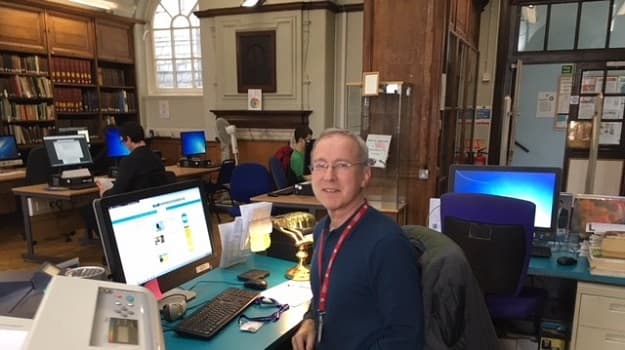
Armed with a chemistry degree, and after a year’s work experience at the Cairns Library in Oxford, I took an MSc in information studies from Sheffield University. My first job was running a chemical information service for big pharma research chemists at Wyeth Research. I stayed for over 25 years, finishing my pharma career in charge of a multi-million dollar resources procurement budget, dealing globally with 1000s of employees 24/7.
In 2010 I took a two-year career break, became a part-time carer and then in 2012 volunteered to help the college catalogue its ‘historic’ 10,000 book collection. A senior colleague left, I became an acting librarian and six months later I gained a permanent, part-time post four days a week.
I manage Learning Resources and service provision to support independent learning and back up the curriculum team with materials across the taught curriculum. Our resources, mainly print, are increasingly digital – tighter budgets mean we can’t keep buying a print, although it’s still the preferred choice for most learners. A key aim is showing you provide value for money, so introducing innovative practices and improving efficiencies plays an important part. We’re a two-person team, with overlap on only two days, so I do everything from acquiring new resources to cataloguing and managing our web content. There’s no downtime!
We generally only take students aged 18-plus, offering level 1 and 2 courses going on to level 3, plus a foundation course for younger students before they apply for more advanced courses elsewhere.
It’s the sheer range of tasks and the many different needs of our students. We serve the local and wider community, focusing particularly on ethnic minority communities and ESOL provision, with a high representation of women, the unemployed and migrant students. Some may have learning difficulties and we offer another chance to those who may have missed out at school, be returning to education or just lack formal qualifications, particularly English and maths. The job also attracts those drawn to academic study and research but who do not want to lecture.
I enjoy the instructional teaching side. We still have some learners using a PC for the first time and who don’t how to print documents or use a browser. We also give feedback to teachers about students who may be struggling.
I’m on desk duty and customer-facing most of the time. At any time, one or more learners can be at the issue desk needing a particular resource, photocopying, borrowing or renewing. Many requests also come in by phone and email. A virtual learning environment (VLE) is embedded in the curriculum and students may need help logging on, accessing course areas or sorting out network account issues. In between requests, I look at data on the library system and which resources I need to buy, and go through requests from our curriculum managers, deciding if I can fund them. We cater for around 1,000 active system users, and many others use the library merely as a place for study. It’s always busy.
We often get requests from researchers to look up college archival materials or our extensive pre-1955 book collection. Last week a researcher came over from Japan to study the methods of the 19th-century art teacher John Ruskin - an early supporter of the college. Another researcher travelled down from Edinburgh to check on a lecture on the properties of rubber given in the 1860s. He actually unearthed a flyer advertising the event!
Catering for all abilities and backgrounds – which is, in fact, one of the most enjoyable parts of the job. We don’t leave anyone out. We aim to support college initiatives that ensure basic numeracy, literacy and digital skills are embedded in the curriculum at all levels.
Another challenge is showing how we make a quantifiable difference … for instance, just recently, we had a student in who had to prepare for a UK citizenship test, so we advised her on which books to borrow and helped her access a computer simulation test. When she returned the books, she said: “Thanks – and by the way, I’ve passed!”
A key time was moving over to the VLE. I worked closely with the e-learning development manager … it gave students on our two college sites remote access to our services and digital resources. It also showed up all warts in the system so we had to work harder to ensure all our bibliographical data was robust and the items listed as stocked had not got displaced.
Previous work experience in a library is a real bonus when applying for a job. And you need more than just basic ICT skills – our library system is quite complex. There is an online library system user group to ask how you deal with a particular problem, and the college will put you on training courses.
I’m told I’m a calm and quiet person - not true (!), though it helps you need to able to handle people. Besides learners, I have to work with staff at all levels from the principal and governors through to learner services.
You can take a first or postgrad degree in librarianship or information management accredited by the Chartered Institute of Library and Information Professionals (Cilip); join a graduate training scheme run by Clip or an employer, or train on the job as an apprentice or library assistant. I attend CPD sessions in both library information services and FE teaching management issues
It’s the feeling I can still add value by helping students develop the skills to go on to a rewarding career, enter higher education or simply enjoy part of their lifelong learning.
Are you passionate about librarianship? If so, maybe our library and LRC jobs might be the perfect fit for you! Browse through our vacancies and apply for your chance to secure that all-important interview.
AoCJobs, part of the Association of Colleges, connects teachers and support staff with schools and colleges for online job opportunities.

